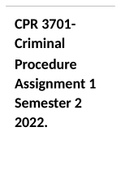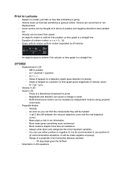CPR 3701-
Criminal
Procedure
Assignment 1
Semester 2
2022.
, To begin with, South Africa does not, in principle, follow a system of compulsory prosecution. The
discretion to prosecute is determined on a case-to-case basis. The decision taken is therefore a result of
the mitigating & aggravating factors. These factors include the nature and seriousness of the offense,
interests of the victim and broader community, circumstances of the offender, previous
convictions, and personal circumstances. A prosecutor may also withdraw a case without the
permission of the DPP. As the DPP may charge the accused afresh. Prosecutors may not stop a
prosecution without the permission of the DPP. DPP my stop prosecution anytime from pleading to
conviction. Accused is entitled to Acquittal and may later successfully rely on a plea of autrefois acquit
the exercise of discretion. A prosecutor will prosecute if there is a prima facie case and if there are no
compelling reasons for one to grant a refusal to prosecute. In light of this, 'prima facie case' would mean
that the allegations being brought to the court, as supported by statements and real and
documentary evidence available to the prosecution, are of such a nature that if proved in a court of law
by the prosecution based on admissible evidence, the court should convict. The prosecutor does not
have to establish whether there is a defense in the case, but rather whether there is a reasonable and
probable cause for prosecution.
The prosecution must at the trial be able to furnish proof beyond a reasonable doubt ascertaining a
probable cause for prosecution. More so in exercising his discretion, the prosecutor must respect the individual's
rights. These include the right not to be harassed by a prosecution that has no reasonable prospects of success
as this does not only costs the state but also violates the rights of the accused. The fact that the prosecutor
doubts the strength of the State case is no good ground for fixing an admission of guilt fine in a summons in
the hope that the accused might pay the admission of guilt fine and thereby relieve the State of the burden of
proving its case 2 with reference to the case of NGJ Trading Stores (Pty) Ltd v Guerreiro, many accused persons
, pay an admission of guilt fine to be rid of the worry, inconvenience, and expense of fighting a petty criminal
charge and not because they are guilty3. It is improper for the prosecution to secure a 'successful prosecution' in
this manner because the payment of an admission of guilt fine does for criminal record purposes amount to a
previous conviction.
Occasionally despite there being an existence of a prima facie case, there might be good grounds for
the prosecutor not to prosecute. Such grounds may be the triviality of the offense 4the advanced age or very
young age of an accused 5 where a plea bargain was struck between the prosecution and the defense,6 and
the antiquated nature of the offense or the tragic personal circumstances of an accused. In the Yutar case,
a former DPP described the discretion to prosecute as a very valuable safeguard, because one has to take into
account what the consequences to an accused may be, apart from any penalty which a court of law might
inflict. If in our view, the consequences are out of all proportions to the gravity of the offense committed, we are
permitted to exercise our discretion and decline to prosecute. 7 However, the fact remains that 'a decision of the
prosecuting authority not to prosecute, must be made for a good reason.8
Paragraph 4(c) of the Prosecution Policy issued by the NDPP in terms of s 21(1)(a) of
National Prosecuting Authority once a prosecutor is satisfied that there is adequate evidence to provide
reasonable prospects of a conviction, a prosecution should therefore follow, unless ‘public interest demands
otherwise’. There is no rule in law which states that all the provable cases brought to the attention of the
Prosecuting Authority must be prosecuted. On the contrary, any such rule would be too harsh and impose an
impossible burden on the prosecutor and society interested in the fair administration of justice.
In considering whether or not to prosecute the following factors have to be considered by the
prosecutor. Firstly the nature and seriousness of the offense. The seriousness of the offense, taking into account
the effect of the crime on the victim, how it was committed, the motivation for the act, and the relationship





